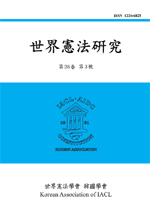프랑스 ‘2004년 환경헌장’의 헌법규범적 성격
Constitutional nature of the Charter for the environment of 2004
- 세계헌법학회한국학회
- 세계헌법연구
- 第28卷 第3號
-
2022.1233 - 63 (31 pages)
-
DOI : 10.24324/KIACL.2022.28.3.33
- 72

‘2004년 환경헌장’은 환경에 관한 국제규범 및 유럽연합 규범의 발달을 배경으로 하지만, 대통령직의 재선을 위한 선거운동 기간 중에 있었던 자크 시락 대통령의 결심이 ‘2004년 환경헌장’의 제정에 직접적인 영향을 미쳤다. ‘2004년 환경헌장’은 프랑스 헌법상 환경권의 근거조항으로 기능한다. ‘2004년 환경헌장’은 선언적 및 상징적 성격을 부여하는 측면에서 제정되었으며, 건강한 환경에 대한 권리(제1조), 환경에 대한 정보 접근권 및 환경에 영향을 미치는 공적 결정에 대한 참여권(제7조)과 같이 권리에 관한 규정을 두고 있을 뿐만 아니라, 예방의 원칙(제3조), 사전배려의 원칙(제5조), 지속가능한 발전의 원칙(제6조) 등 환경에 관한 국제규범상의 원칙을 헌법명문으로 인정하고 있다. 또한 미래세대의 기본권으로 해석될 수 있는 규정(전문, 제1조 및 제7조)도 포함하고 있다. 이와 같은 헌법제정자의 의사에도 불구하고, 프랑스 헌법재판소는 최근에 ‘2004년 환경헌장’의 헌법규범적 효력을 인정하면서, 입법자의 형성의 자유를 보다 구속하는 입장을 전개하고 있다. 프랑스 헌법재판소는 ‘2004년 환경헌장’ 제1조의 주관적 권리성과 수평적 효력을 인정하는 입장을 취하고 있으며, 제7조의 정보 및 참여의 권리에 대한 입법형성의 자유를 보다 구속하는 태도를 보이고 있다. 우리의 경우 환경권을 국가기관에 대하여 구속력을 가지고 국가행위의 방향을 제시하는 국가의 과제규범 또는 목표조항으로 이해하고, 주관적 권리로서의 성격을 부인하는 해석이 존재하지만, 이와 같은 해석은 헌법제정권자가 대한민국 헌법상 환경권을 명문으로 인정하고 있는 취지와 전 세계적으로 전개되고 있는 기후위기 등 절박한 환경문제에 대한 대처 필요성의 측면에서 비판적으로 검토되어야 한다.
The Charter for the environment of 2004 was enacted following President Jacques Chirac's determination during his campaign to re-elect the presidency. The Charter for the environment of 2004 is the basis for environmental rights in the French Constitution. The Charter for the environment of 2004 was enacted to give declarative and symbolic character. The Charter for the environment of 2004 includes rights to a healthy environment (Article 1), access to information to the environment, and participation in public decisions affecting the environment (Article 7), as well as principles of prevention (Article 3), precaution (Article 5), and sustainable development (Article 6). The Charter for the environment of 2004 also includes fundamental rights of future generations (Articles 1 and 7). The French Constitutional Court recently recognized the constitutional normative effect of the Charter for the environment of 2004, developing a position that further restricts legislators' discretion. The French Constitutional Court takes a position to recognize the subjective rights and horizontal effect of Article 1 of The Charter for the environment of 2004, and shows an attitude that further restricts the freedom of legislative formation on the right to information and participation in Article 7. In the case of Korea, there is an interpretation that understands environmental rights as a national task norm or goal clause that presents the direction of national action with binding force to state institutions and denies the nature of the subjective right. This interpretation should be critically reviewed in terms of the purpose of recognizing environmental rights under the Constitution of the Republic of Korea and the need to deal with desperate environmental problems such as the global climate crisis.
Ⅰ. 들어가는 말
Ⅱ. ‘2004년 환경헌장’의 제정배경 및 제정과정
Ⅲ. ‘2004년 환경헌장’의 주요내용
Ⅳ. 프랑스 헌법재판소의 ‘2004년 환경헌장’의 적용
Ⅴ. 맺음말
(0)
(0)